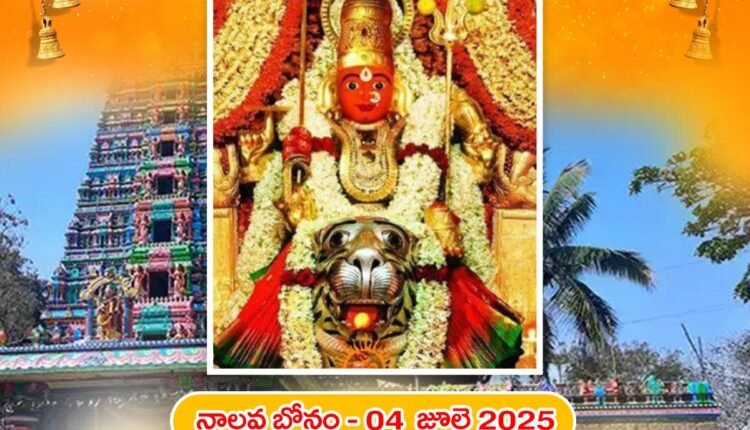
Peddamma Thalli Bonam : In the heart of Hyderabad, nestled amidst the bustle of Jubilee Hills, lies the sacred Peddamma Thalli Temple, a divine abode dedicated to the Goddess revered as the embodiment of Shraddha (faith) and Shakti (power). Every year during the auspicious month of Ashada Masam, this temple becomes the epicenter of devotion, tradition, and vibrant celebration as thousands gather to offer the Bonam—a heartfelt thanksgiving to the Mother Goddess.
Peddamma Thalli Bonam – Origins of Bonalu
The tradition of Bonalu dates back to the early 19th century, believed to have originated in Telangana as a form of offering to Goddess Mahankali during times of plague and disease. Devotees, out of deep shraddha, promised to offer a “Bonam” (a meal cooked with rice, jaggery, and curd) in decorated brass or earthen pots, should the goddess protect their village. The goddess fulfilled their prayers, and the ritual of Bonalu became a lasting tradition, passed down through generations.
Peddamma Thalli – “The Mother of All Mothers”
The word Peddamma itself means “The Supreme Mother,” and devotees believe her to be the most powerful guardian deity who watches over not just homes, but the entire region. The temple in Jubilee Hills is particularly famous for its grand Bonalu celebrations, which are known for their scale, devotion, and the pure energy that envelops the surroundings.
The Peddamma Thalli Bonam isn’t just a religious observance—it is a spiritual declaration of faith, gratitude, and surrender. Women, dressed in traditional finery, carry the Bonam on their heads, walking barefoot to the temple, often accompanied by rhythmic drumbeats, colorful processions, and community singing. Each Bonam is not just food, but a sacred symbol of fulfillment, a promise kept, and a plea for continued protection.
Rituals and Celebrations
The festivities begin early in the morning, with the temple resonating with chants, bells, and the fragrance of turmeric, neem, and incense. The Bonam, carried with reverence, is adorned with neem leaves, bangles, turmeric-smeared coins, and a lit lamp on top—a representation of life, purity, and the divine presence of the Goddess herself.
As the Bonams are offered, oracle women (known as rangam performers) enter trance-like states and deliver messages believed to be from the Goddess. Their presence is considered sacred, reinforcing the belief that the Mother is present among her children.
The rituals continue with Potharaju, the guardian brother of the Goddess, leading the processions, dancing vigorously, smeared with turmeric and vermillion, wielding whips—symbolizing his protection of the divine and the community.
A Celebration of Community and Culture
Beyond the spiritual fervor, the Peddamma Thalli Bonam is also a vibrant display of Telangana’s rich cultural heritage. Folk music, Haridasulu performances, traditional dance forms like Perini, and decorative art come alive, reflecting the deep-rooted connection between the people and their traditions.
Bonalu is not just a festival—it is a lived expression of the people’s devotion and resilience, their unwavering shraddha, and the protective power of the Shakti they worship.
Conclusion
The Jubilee Hills Peddamma Thalli Bonam is more than a ritual; it is an emotion that pulses through the hearts of the faithful. As the beats of the dappu echo through the streets and the aroma of sacred food fills the air, the community bows in unity and reverence. It is here that faith meets tradition, and the divine mother—Peddamma Thalli—bestows her blessings upon all who come with pure hearts and steady devotion.
Also Read : Telugu Traditions – Bonalu

